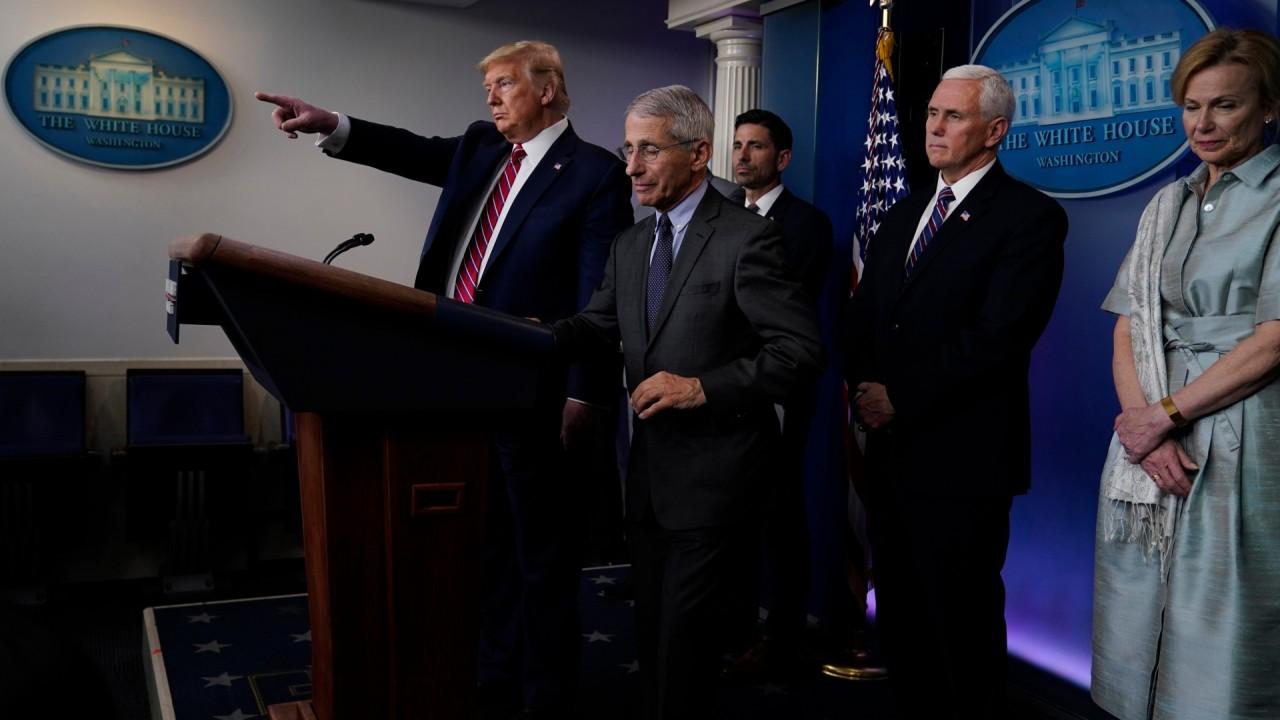Coronavirus lockdowns multiply globally as health systems strained
Some American states move to restrict residents to homes
BERLIN — Streets, squares and highways were deserted in large parts of the world Saturday as curfews and lockdowns multiplied in the face of a rapidly advancing virus that is severely straining many health systems.
Three American states with a combined population of 70 million are moving to restrict residents to their homes to prevent the spread of the new coronavirus. California started Friday and New York and Illinois were to follow this weekend. Connecticut and Oregon were preparing to do the same.
Once-bustling outdoor plazas fell quiet in Bavaria after it became the first German state to tell people to stay home, except to go to work, buy food, visit the doctor or exercise. Police reported fewer people breaching the curfew than in previous nights.
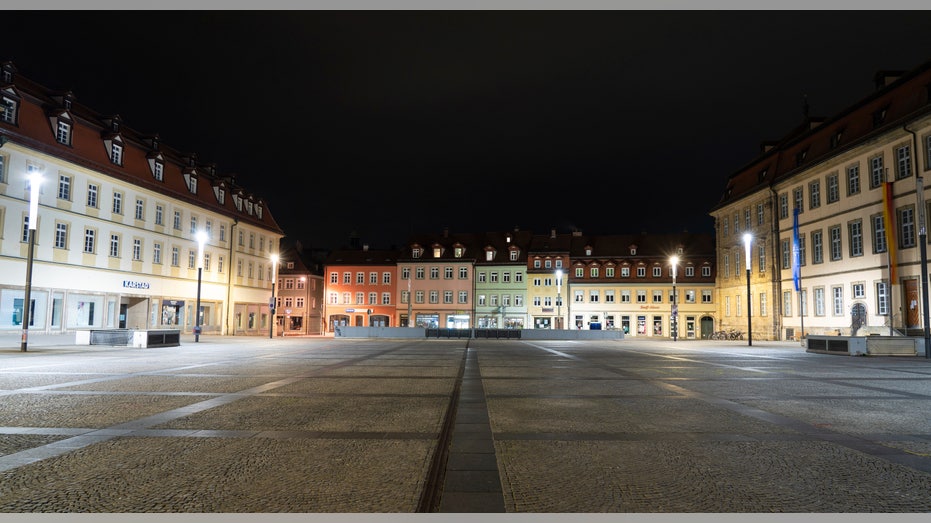
The deserted Maximiliansplatz is seen in the city center of Bamberg, Germany, shortly after midnight, early Saturday morning, March 21, 2020. (Nicolas Armer/dpa via AP)
CORONAVIRUS PUSHES MENTAL HEALTH COUNSELING ONLINE
Colombia became the latest South American country to announce a lockdown, and Sri Lanka closed all expressways for a weekend curfew.
The number of confirmed cases of COVID-19 recorded in Africa rose above 1,000 Saturday, according to the Africa Centers for Disease Control and Prevention. At least 40 of Africa’s 54 countries now have cases.
More than 275,000 cases have been confirmed globally, including over 11,000 deaths, according to a running tally by Johns Hopkins University. At least 88,000 have recovered.
For most people, the new virus causes only mild or moderate symptoms, such as fever and cough. For some, especially older adults and people with existing health problems, it can cause more severe illness, including pneumonia. The vast majority recover.
But with hospitals already under pressure, officials in many countries are desperate to prevent — or at least limit — a repeat of what has happened in China and southern Europe. The coronavirus outbreak overwhelmed medical services in the central Chinese city of Wuhan earlier this year and now is pushing them to the limit in Italy and Spain.
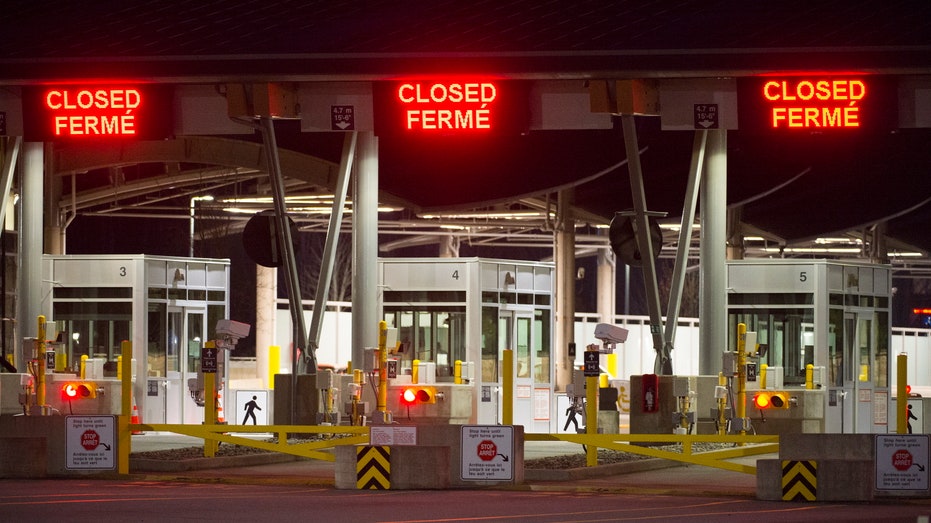
The Peace Arch Canada-U.S. border crossing in Surrey, British Columbia, Friday, March 20, 2020. New restrictions went into effect at midnight Friday along Canada's shared border with the U.S. (Jonathan Hayward/The Canadian Press via AP)
FOOD TRUCK SHUT BY CORONAVIRUS DELIVERS MEALS TO HOMEBOUND SENIORS
Germany's southwestern state of Baden-Wuerttemberg on Saturday offered to take in patients from the neighboring region of eastern France that's struggling with a surge of infections overwhelming hospitals.
In Britain, which still lags behind Italy, Spain and France in the spread of the virus, the country’s overstretched health system is creaking. The state-funded National Health Service has about 4,000 critical-care beds and some 5,000 ventilators, and officials say that's far fewer than will be needed as the number of cases spikes in the coming weeks. Britain has already asked 65,000 retired nurses and doctors to return to work.
Lisa Anderson, a consultant cardiologist at St George's Hospital in London, sad "there is a lack of protection for us which extends to a lack of plan of how to segregate patients clean and dirty, how to protect us and keep us away from the public.”
“Doctors have no faith in what is going on,” she told the BBC.
Britain has recorded 3,983 confirmed cases of COVID-19 and 177 deaths.
China has been sending aid to several European countries, promoting its expertise and experience gained from fighting the outbreak at home. An Air China flight carrying 18 tons of medical supplies including hundreds of thousands of surgical and protection masks landed in the Greek capital, Athens, Saturday morning.
As the pandemic has eased in Asia, China and other parts of the region are now trying to avoid importing cases from Europe, the U.S. and elsewhere.
China reported Saturday that its mainland had no new home-grown cases of the disease for the third straight day, but 41 imported ones in the previous 24-hour period. That followed a surge in cases in the territory of Hong Kong on Friday, including 35 imported ones.
Restrictions on movement are being eased gradually in China as it tries to restart the economy without bringing back the disease.
Officials in Wuhan are permitting supermarkets, convenience stores and some other retail businesses to reopen from 9 a.m. to 6 p.m. if they are in areas with no confirmed or suspected cases. One person from each household is allowed to go out daily for a shopping trip of up to two hours.
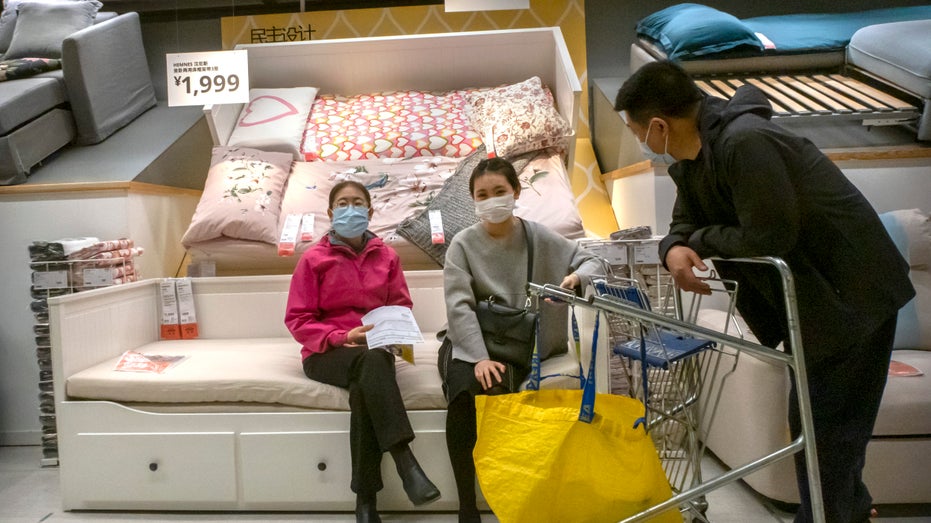
People wear face masks to protect against coronavirus infection as they shop at an IKEA store in Beijing, Saturday, March 21, 2020. (AP Photo/Mark Schiefelbein)
GET FOX BUSINESS ON THE GO BY CLICKING HERE
The Beijing Zoo said its outdoor areas would reopen Monday, but visitors have to wear masks and make reservations at least one day in advance. Most major museums and attractions in China have been closed for nearly two months to stop the spread of the virus.
In the U.S., the restrictions on movement take effect Saturday in Illinois and Sunday in New York. All workers in nonessential businesses will be required to stay home and gatherings of any size are banned in New York. Exceptions will be made for important errands, such as buying groceries and medicine, and for exercise.
The lockdowns in California and other states sent stock markets tumbling again. Wall Street had its worst week since the 2008 financial crisis, with the Dow Jones Industrial Average falling more than 900 points and down 17% for the week.

Extremely light traffic moves along the 110 Harbor Freeway toward downtown mid afternoon, Friday, March 20, 2020, in Los Angeles. Traffic would normally be bumper-to-bumper during this time of day on a Friday. (AP Photo/Mark J. Terrill)
SELLERS’ AMAZON LOANS AT RISK AS COMPANY LIMITS WAREHOUSES
Car maker BMW said it would shut down a huge manufacturing complex in South Carolina from April 3 to 19 and Nissan said it would suspend vehicle production at its two Mexican assembly plants from next Wednesday through April 14. Auto production has resumed in China, but only partially.
A member of Vice President Mike Pence’s staff has tested positive for the coronavirus, the White House said. A spokeswoman said the person did not have close contact with either Pence or President Donald Trump.
Colombian President Iván Duque announced Friday night that everyone would be required to isolate in their homes for three weeks starting Tuesday. The capital, Bogota, began its own lockdown Friday, leaving the city’s usually traffic-filled streets largely empty.
Colombia has 158 confirmed cases, and officials are hoping that drastic measures now will limit the number of new cases in the weeks ahead. Peru, Ecuador and Venezuela already are in lockdown.
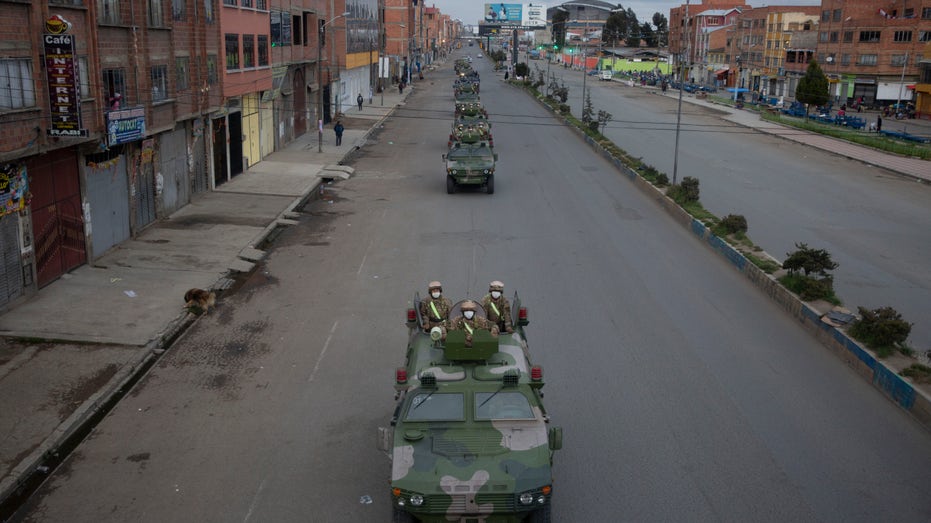
Military armored vehicles patrol the streets in El Alto, Bolivia, Friday, March 20, 2020. Authorities have decreed a quarantine from 5 p.m. to 5 a.m. (AP Photo/Juan Karita)
CORONAVIRUS LEADS STARBUCKS TO SHIFT TO DRIVE-THRU SERVICE ONLY
Spain was approaching one week of tight restrictions on free moment and the closure of most shops Saturday, as hospitals and nursing homes buckled under the burden of the virus outbreak. Health authorities have acknowledged that some intensive care units in the hardest-hit areas, led by hospitals in Madrid, are reaching their limits.
By Friday, Spain had the third-highest number of infections worldwide, with nearly 20,000 confirmed cases, and 1,002 deaths. Some privately owned factories in the country have joined in the effort to combat the national emergency by converting their production lines to make much-needed masks, gloves and disinfectant gels for hospitals.
Spanish soldiers were deployed to disinfect airports and nursing homes, while police intensified their efforts to enforce confinement rules with fines and extra patrols to stop city-dwellers with second homes in the country from leaving town for the weekend.
But there was concern about the possible unwanted side-effects that extended curfews around the world might have, including increased instances of domestic violence.
“The authorities know or should know that confinement measures will also cause casualties, among women and children,” Agnes Callamard, a U.N. appointed human rights expert, said on Twitter.
“An emergency plan to protect them is needed."
CLICK HERE TO READ MORE ON FOX BUSINESS




















